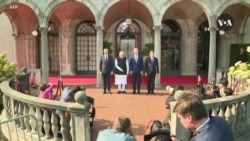How the U.S. is helping India build nuclear power plants and why officials believe they are crucial to the peace and stability in the Indo-Pacfic region.
Welcome to VOA Asia Weekly. I'm Chris Casquejo in Washington. That story is just ahead, but first, making headlines:
Chinese officials have called off the search for survivors after a 7.1-magnitude earthquake Tuesday struck one of Tibet's holiest cities, Tingri, killing more than 120 people and trapping more than 400 under the rubble. The tremors also affected Nepal, Bhutan, and India. The Dalai Lama, Tibet’s highest spiritual leader, and other Tibetan exiles have offered prayers for the victims.
"As a minister who is responsible for aviation safety, I feel heavy responsibility for this disaster.”
South Korea's Transportation Minister Park Sang-Woo plans to resign over the deadly Jeju Air crash that killed 179 people last month. He said he would find the right time to step down after addressing the current situation.
North Korean state media reported the successful test launch of a new intermediate-range hypersonic missile. The missile is designed to strike remote targets in the Pacific islands. North Korean dictator Kim Jong Un said that his nuclear push is to counter "different security threats the hostile forces posed to our state.”
The Philippines has deployed its coast guard to monitor China’s largest coast guard vessel, nicknamed “the Monster.” The Philippines said that the vessel has operated in the U.S. ally’s exclusive economic zone for three consecutive days, calling its presence an act of "intimidation, coercion, and aggression.
One is confirmed dead and two others feared lost as rescuers and soldiers search for six workers trapped inside a flooded coal mine in Assam in northeast India. The workers are trapped 300 feet below ground. The Assam Chief Minister says the mine appears to be illegal. Police have arrested one person.
The Biden administration this week removed obstacles to India’s quest for nuclear power, with U.S. national security adviser Jake Sullivan visiting New Delhi and describing the India-U.S. collaboration as “crucial” for peace and stability in the Indo-Pacific. VOA White House correspondent Anita Powell asks what lies ahead as Donald Trump returns to the White House.
India’s nuclear-power ambitions face one fewer obstacle now, said U.S. national security adviser Jake Sullivan, in New Delhi.
"The United States is now finalizing the necessary steps to remove long-standing regulations that have prevented civil nuclear cooperation between India's leading nuclear entities and U.S. companies. The formal paperwork will be done soon, but this will be an opportunity to turn the page on some of the frictions of the past."
Indian liability rules had posed an obstacle to U.S. companies that hoped to build power plants in India in that they assigned high liability to builders and suppliers of nuclear power plants in case of accidents.
President Joe Biden has elevated Washington’s relationship with New Delhi, And in September hosted Prime Minister Narendra Modi at his home for the first leaders’ gathering of the “Quad”: four nations poised as a counterweight to Beijing.
India-watchers in Washington say Sullivan's visit launched key announcements in areas like space cooperation, defense and more — all meant to build momentum for the next U.S. administration — and to let the outgoing leadership make a point:
“I think it really does put a really, a really strong pound-point on the fact that India is prioritized there and above a lot of our other partnerships.”
And it’s a partnership that has grown even amid their differences, like India’s continuing ties with Moscow after Russia invaded Ukraine.
Rossow listed reasons that he believes security cooperation will stay afloat, and cited Trump and Modi’s good personal rapport. The tension this time around, he said, will be economic.
“You're going to have less cheering for outbound investments, a lot more pressure on India to buy more American goods, whether it's hydrocarbons or defense goods – the things the government of India actually has control of buying. So the economic side is where I'm a little bit more concerned.) I think India will fare better than a lot of our major partnerships in the next four years.”
Anita Powell, VOA News, Washington
Visit voanews.com for the most up-to-date stories.
I’m Chris Casquejo.
Finally, while people are slipping and sliding their way through the streets of DC, our panda friends at the National Zoo seem to view the snow differently.
Bao Li and Qing Bao enjoyed their first snowfall in their new home at the National Zoo in Washington, D.C. The panda duo rolled in the snow and climbed trees. They'll make their public debut at the zoo on Friday, January 24th.
Thanks for watching VOA Asia Weekly.











